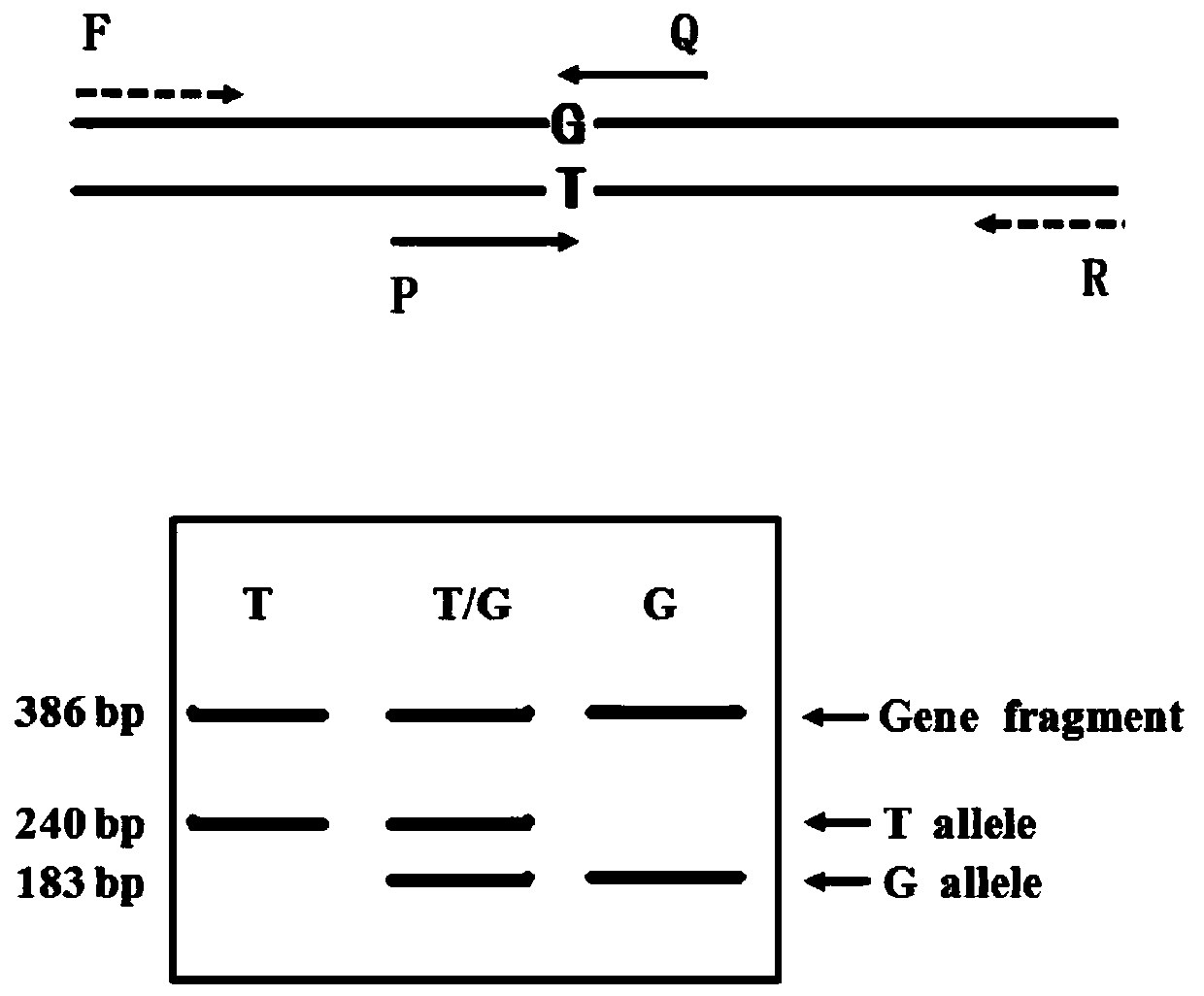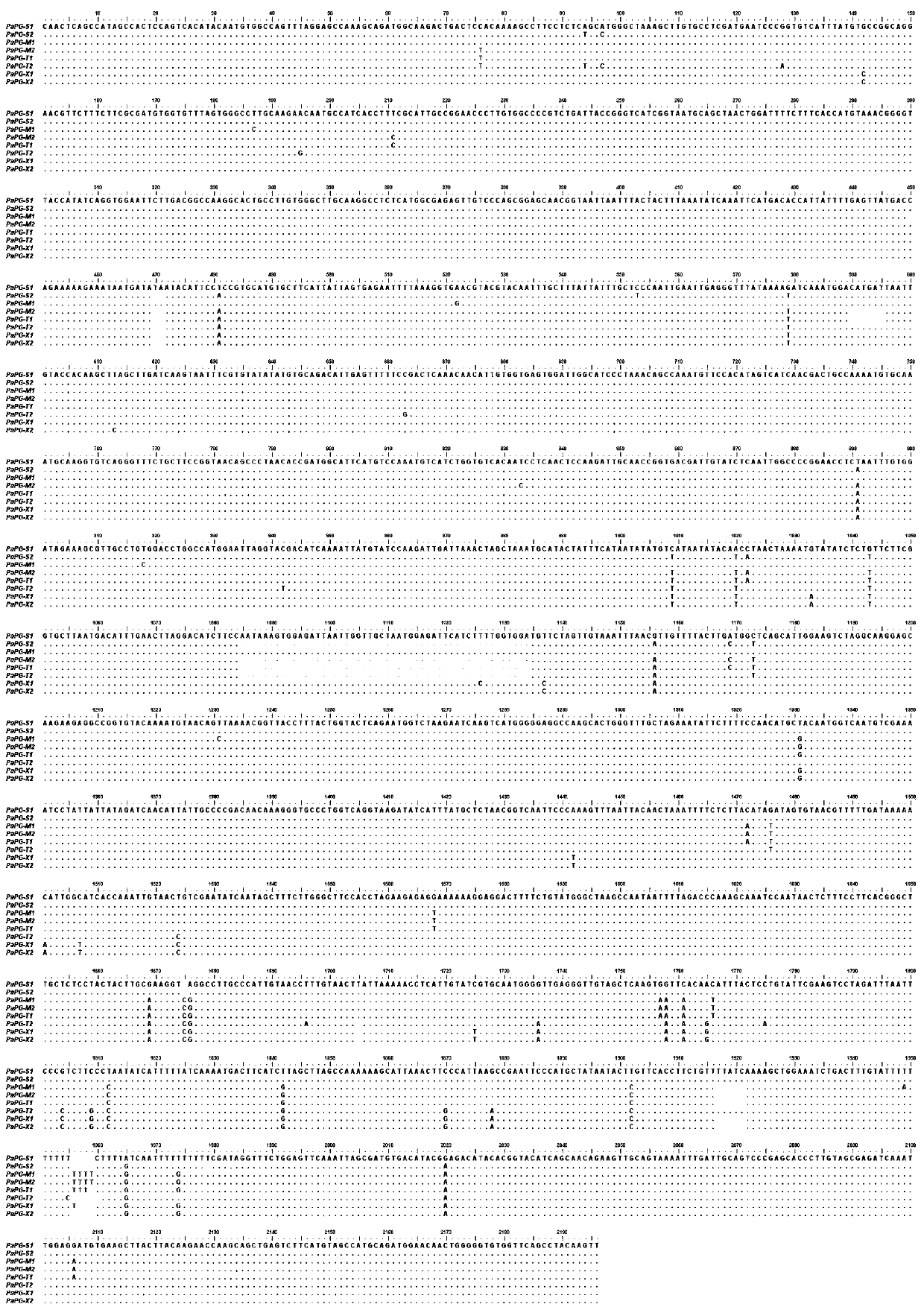Apricot fruit firmness key gene molecular marker PG1524 and detection method and application thereof
A molecular marker, fruit technology, applied in biochemical equipment and methods, microbial determination/inspection, DNA/RNA fragments, etc., can solve the problems of high average sample analysis price, high sample requirements, and cumbersome operation, and reduce planting. area, accelerated breeding process, low cost effect
- Summary
- Abstract
- Description
- Claims
- Application Information
AI Technical Summary
Problems solved by technology
Method used
Image
Examples
Embodiment 1
[0027] Example 1: Acquisition of SNP molecular marker PG1524
[0028] (1) Download the PG gene sequence of apricot (Goldrich) (GenBank accession No.HG540310) and the PG gene sequence of peach (GenBankaccession No.) from GenBank of NCBI (website: http: / / www.ncbi.nlm.nih.gov) .DQ340809), using this as a template, use the software Primer premier 5.0 to design 2 pairs of gene-specific primers (PG-1 / PG-2, PG-3 / PG-4). The primer sequences are shown in Table 1.
[0029] Table 1 Primer sequence
[0030]
[0031] (2) According to the National Fruit Tree Germplasm, Xiongyue Li Xing Garden, apricot resources and fruit hardness survey data, two hard flesh varieties were selected: Sungold and Moopark; two soft flesh varieties were selected: Xianju apricot and Xiaosaimai, young and tender were collected in spring Leaves, using modified CTAB method to extract genomic DNA.
[0032] (3) Using the genomic DNA of the above four apricot varieties as templates, the primers (PG-1 / PG-2, PG-3 / PG-4) were use...
Embodiment 2
[0036] Example 2: Testing the fruit hardness traits of the genetic population "Camel Yellow x Golden Sun" at the seedling stage
[0037] (1) Construction of genetic population
[0038] A cross combination was configured with soft apricot variety ‘Luotuohuang’ as the female parent and hard apricot variety ‘Golden Sun’ as the male parent, and 25 F plants were obtained. 1 Generation hybrid population.
[0039] (2) The leaves of annual seedlings were collected in spring, and genomic DNA was extracted by modified CTAB method.
[0040] (3) Amplify with primer pair (F / R, P / Q) of molecular marker PG1524. The PCR reaction system is 20 μL, including 5.0 μL of DNA template, 10.0 μL of 2×Taq Master Mix (Beijing Kangwei Century Biological Company), 1.0 μL of positive and negative inner primers, 0.5 μL of positive and negative outer primers, and 2 μL of water. The PCR amplification procedure is as follows: 95°C for 5min; 94°C for 40s, 55°C for 40s, 72°C for 45s, 35 cycles; 72°C for 10min. The PCR...
Embodiment 3
[0043] Example 3: Testing the fruit hardness characteristics of 120 common apricot resources
[0044] (1) The leaves of 120 ordinary apricots were collected in spring, and the genomic DNA was extracted by the modified CTAB method.
[0045] (2) Amplify with primer pair (F / R, P / Q) of molecular marker PG1524. The PCR reaction system is 20 μL, including 5.0 μL of DNA template, 10.0 μL of 2×Taq Master Mix (Beijing Kangwei Century Biological Company), 1.0 μL of positive and negative inner primers, 0.5 μL of positive and negative outer primers, and 2 μL of water. The PCR amplification procedure is as follows: 95°C for 5min; 94°C for 40s, 55°C for 40s, 72°C for 45s, 35 cycles; 72°C for 10min. The PCR products were separated by electrophoresis on a 2% agarose gel, stained with ethidium bromide, and the gel imaging system scanned and saved the image.
[0046] (3) Count the genotype of each plant and predict its fruit hardness traits. The genotype containing fragment 1 (408bp) and fragment 2...
PUM
| Property | Measurement | Unit |
|---|---|---|
| hardness | aaaaa | aaaaa |
Abstract
Description
Claims
Application Information
 Login to View More
Login to View More - R&D
- Intellectual Property
- Life Sciences
- Materials
- Tech Scout
- Unparalleled Data Quality
- Higher Quality Content
- 60% Fewer Hallucinations
Browse by: Latest US Patents, China's latest patents, Technical Efficacy Thesaurus, Application Domain, Technology Topic, Popular Technical Reports.
© 2025 PatSnap. All rights reserved.Legal|Privacy policy|Modern Slavery Act Transparency Statement|Sitemap|About US| Contact US: help@patsnap.com



